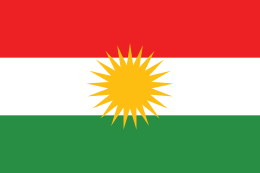
Back قومية كردية Arabic Nacionalismu curdu AST کوردایەتی CKB Kurdayetî German Κουρδικός εθνικισμός Greek Nacionalismo kurdo Spanish Nazionalismo kurdu Basque ملیگرایی کردی Persian Mouvement national kurde French Nacionalismo kurdo Galician
 |


Kurdish nationalism (Kurdish: کوردایەتی, romanized: Kurdayetî, lit. 'Kurdishness or Kurdism') is a nationalist political movement which asserts that Kurds are a nation and espouses the creation of an independent Kurdistan from Iran, Iraq, Syria, and Turkey.
Early Kurdish nationalism had its roots in the Ottoman Empire, within which Kurds were a significant ethnic group. With the partitioning of the Ottoman Empire, its Kurdish-majority territories were divided between the newly formed states of Turkey, Iraq, and Syria, making Kurds a significant ethnic minority in each state. Kurdish nationalist movements have long been suppressed by Turkey and in the states of Iran, Iraq, and Syria, all of whom have fear of a potential independent Kurdistan.[citation needed]
Since the 1970s, Iraqi Kurds have pursued the goal of greater autonomy and even outright independence against the Iraqi nationalist Ba'ath Party regimes, which responded with brutal repression, including the massacre of 182,000 Kurds in the Anfal genocide. The Kurdish–Turkish conflict, where Kurdish armed groups have fought against the state, has been ongoing since 1984. After the 1991 uprisings in Iraq, UN enforced the Iraqi no-fly zones under resolution 688, which included over much of Iraqi Kurdistan, facilitating autonomy and self-government outside the control of the Iraqi government. After the 2003 invasion of Iraq that ousted Saddam Hussein, the Kurdistan Regional Government was established, enjoying a great measure of self-governance but stopping short of full independence.